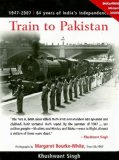“Train to Pakistan” is a short and deeply moving novel by Khushwant Singh. It shows the effect of the partition of India, as the British left the country, on the simple folks of Mano Majra, a small Indian village on the banks of the river Sutlej near the border of India and Pakistan. The Sikhs and Muslims of the village, living happily together for centuries without any animosity towards each other, get caught up in forces beyond their control with the Muslims forced to flee to Pakistan and the Sikhs getting ready to kill unknown strangers who just happen to be Muslims.
The peace of the little village is shattered when a robbery at night results in the killing of the village moneylender by dacoits from elsewhere. The police arrest, without firm grounds, the village ruffian and an educated stranger out on a mission to spread communist ideals among the peasants. This turn of events ends up being just a prelude to a larger upheaval in the lives of the villagers.
The partition of India into Hindu-majority India and Muslim-majority Pakistan at the time of its independence from British rule caused about ten million people in the two countries to flee their homes and move into the other country. The accompanying riots killed about one million people and open abuse of countless women. Heavily-crowded trains carrying fleeing families would be stopped by irate mobs, their passengers slain indiscriminately and then allowed to cross over to the other country.
The arrival of such a train laden with corpses into Mano Majra brings the villagers face-to-face with the ugly realities of partition. The arrival of rabble-rousers from elsewhere causes many of the villagers to get ready to kill people fleeing into Pakistan and determined to send a corpse-laden train into that country as a token of revenge. Only the village ruffian stands between them and the execution of their demonic plans.
The prose in the book is quite simple and easy to read, though some of the phrases might seem a little strange in English without the knowledge of the corresponding phrases in Hindi or Punjabi. To his credit, the author shows no bias in laying bare the evil that overtook both sides. I am a little puzzled by the missing article in the title - surely it ought to be “The Train to Pakistan”, no?
The book leaves a lingering sadness in its wake. It is however a useful aid in understanding the deep injuries that have left permenant scars on the two countries.
